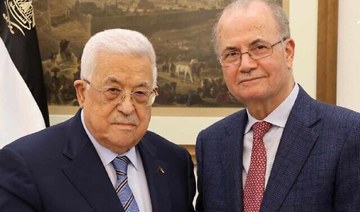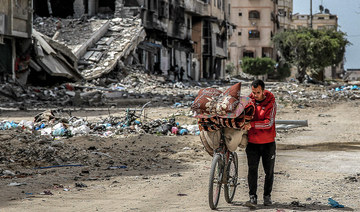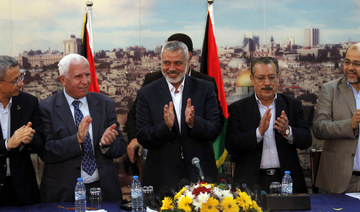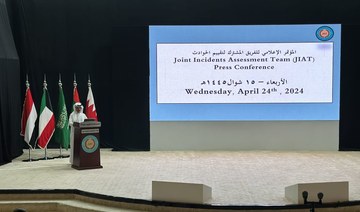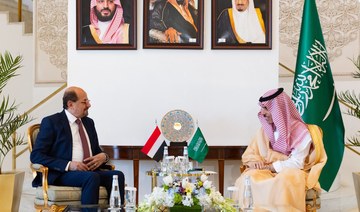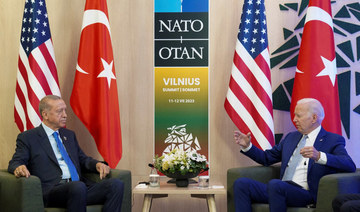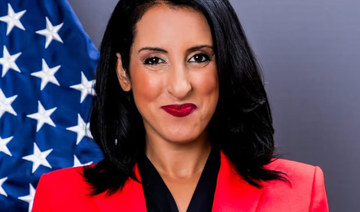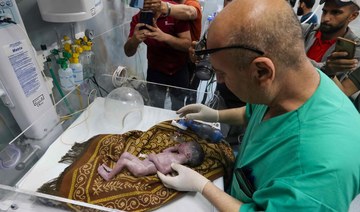GAZA STRIP, Palestinian Territories: Israeli Prime Minister Benjamin Netanyahu approved Friday new talks on a Gaza ceasefire, a day after the world’s top court ordered Israel to ensure urgent humanitarian aid reaches people in the Palestinian territory.
But despite a binding United Nations Security Council resolution this week demanding an “immediate ceasefire,” fighting continued Friday, including around hospitals.
Regional fallout from the conflict also flared, with Israel saying it killed a Hezbollah rocket commander in Lebanon, and several Hezbollah fighters killed in Syria strikes that a war monitor blamed on Israel.
Netanyahu’s office said new talks on a Gaza ceasefire and hostage release will take place in Doha and Cairo “in the coming days... with guidelines for moving forward in the negotiations,” days after they appeared stalled.
In its order, the International Court of Justice (ICJ) in The Hague said: “Palestinians in Gaza are no longer facing only a risk of famine, but... famine is setting in.”
Philippe Lazzarini, head of the UN agency for Palestinian refugees, posted on X that the ruling was “a stark reminder that the catastrophic humanitarian situation in the Gaza Strip is man made + worsening.”
The court had ruled in January that Israel must facilitate “urgently needed” humanitarian aid to Gaza and prevent genocidal acts, but Israel rejected the case brought by South Africa.
The latest binding ICJ ruling, which has little means of enforcement, came as Israel’s military said Friday it was continuing operations in Al-Shifa Hospital, the territory’s largest, for a 12th day.
Throughout the coastal territory, dozens of people were killed overnight, the health ministry in Hamas-run Gaza said.
Among the dead were 12 people killed in a home in the southern city of Rafah, which has been regularly bombed ahead of a mooted Israeli ground operation there.
Men worked under the light of mobile phones to free people trapped under debris after an air strike, AFPTV images showed.
The ICJ ordered Israel to “take all necessary and effective measures to ensure, without delay” the supply “of urgently needed basic services and humanitarian assistance.”
The war began with Hamas’s October 7 attack that resulted in about 1,160 deaths in Israel, mostly civilians, according to an AFP tally based on Israeli official figures.
Israel’s retaliatory campaign to destroy Hamas has killed at least 32,623 people, mostly women and children, Gaza’s health ministry says.
Large parts of the territory have been reduced to rubble, and most of Gaza’s population are now sheltering in Rafah.
On Monday the UN Security Council demanded an “immediate ceasefire” in Gaza, the release of hostages held by militants, and “ensuring humanitarian access.”
Member states are obliged to abide by such resolutions, but the Doctors Without Borders (MSF) charity said nothing has changed on the ground.
Aid groups say only a fraction of the supplies required have been allowed in since October, when Israel placed Gaza under near-total siege.
Israel has blamed shortages on the Palestinian side, namely a lack of capacity to distribute aid, with humanitarians saying not enough trucks are allowed in to make deliveries.
With limited ground access, several nations have staged airdrops, and a sea corridor from Cyprus has delivered its first food aid.
The UN says Gaza’s health system is collapsing “due to ongoing hostilities and access constraints.”
Israel’s military accuses Hamas and the Islamic Jihad of hiding inside medical facilities, using patients, staff and displaced people for cover — charges the militants have denied.
On Friday the army said it was “continuing precise operation activities in Shifa Hospital” where it began a raid early last week.
Troops first raided Al-Shifa in November, before Israel in January announced it had “completed the dismantling” of Hamas’s command structure in northern Gaza. Palestinian militants and commanders had since returned to Al-Shifa, the army said.
Netanyahu has said troops “are holding the northern Gaza Strip” and also the southern city of Khan Yunis, amid heavy fighting.
“We have bisected the Strip and we are preparing to enter Rafah,” he said Thursday.
Netanyahu is under domestic pressure over his failure to bring home all of the hostages seized by militants on October 7. Israel says about 130 captives remain in Gaza, including 34 presumed dead.
About 200 militants have been killed during the latest Al-Shifa operation, the military said.
Near Al-Amal Hospital in Khan Yunis, troops carried out “targeted raids on terrorist infrastructure,” killing dozens in combat backed by air support, the army said Thursday.
Israeli tanks and armored vehicles have massed around another Khan Yunis health facility, the Nasser Hospital, the Gaza health ministry said.
An analysis of satellite images shows heavily damaged areas around the Nasser and Al-Amal hospitals.
Since the Gaza war began, Israel has increased its strikes in Syria, targeting army positions and Iran-backed forces including Lebanon’s Hezbollah movement, a key Hamas ally.
A Britain-based war monitor said Israeli air strikes Friday in north Syria killed at least 42 people, six from Hezbollah and 36 Syrian soldiers.
And Israel’s military said it killed Ali Abdel Hassan Naim, deputy commander of Hezbollah’s rocket unit, in an air strike in south Lebanon Friday.
US, Egyptian and Qatari mediators have tried to secure a truce in Gaza, but those talks had appeared deadlocked more than halfway through the Muslim holy month of Ramadan.
Tensions have risen between Netanyahu and Washington, which provides billions of dollars in military aid but has grown increasingly vocal about the war’s impact on civilians.
Washington has also raised the issue of Gaza’s post-war rule. It has suggested a future role for the Palestinian Authority, which has partial administrative control in the Israeli-occupied West Bank.
On Thursday, Palestinian president Mahmud Abbas approved the new government of prime minister Mohammed Mustafa, who said his cabinet will work on “visions to reunify the institutions, including assuming responsibility for Gaza.”
Hamas forcibly took Gaza from Abbas’s government in 2007.
Netanyahu says Israel must have “security responsibility” in Gaza, and has rejected calls for a Palestinian state.
Israel’s Netanyahu approves new Gaza ceasefire talks
https://arab.news/nvaev
Israel’s Netanyahu approves new Gaza ceasefire talks
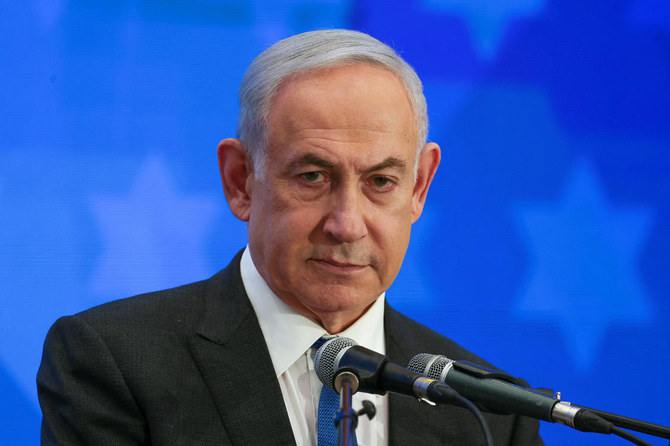
- Regional fallout from the conflict also flared, with Israel saying it killed a Hezbollah rocket commander in Lebanon, and several Hezbollah fighters killed in Syria strikes
- Netanyahu’s office said new talks on a Gaza ceasefire and hostage release will take place in Doha and Cairo “in the coming days... with guidelines for moving forward in the negotiations“
Hamas says it received Israel’s response to its ceasefire proposal
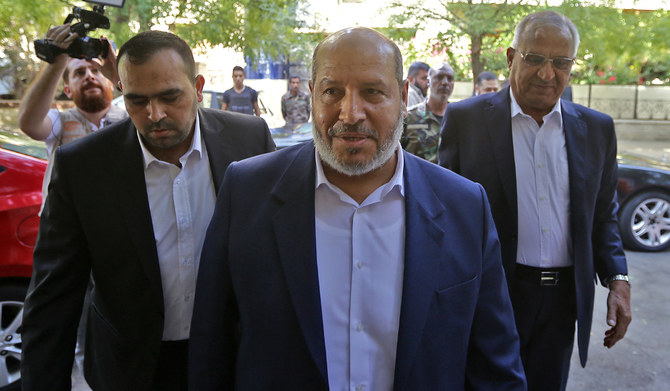
- White House national security adviser Jake Sullivan said on Friday he saw fresh momentum in talks to end the war and return the remaining hostages
- Israel has killed more than 34,000 Palestinians in Gaza, mostly women and children, according to the health ministry in the Hamas-run territory
CAIRO: Hamas said it had received on Saturday Israel’s official response to its latest ceasefire proposal and will study it before submitting its reply, the group’s deputy Gaza chief said in a statement.
“Hamas has received today the official response of the Zionist occupation to the proposal presented to the Egyptian and the Qatari mediators on April 13,” Khalil Al-Hayya, who is currently based in Qatar, said in a statement published by the group.
After more than six months of war with Israel in Gaza, the negotiations remain deadlocked, with Hamas sticking to its demands that any agreement must end the war.
An Egyptian delegation visited Israel for discussion with Israeli officials on Friday, looking for a way to restart talks to end the conflict and return remaining hostages taken when Hamas fighters stormed into Israeli towns on Oct. 7, an official briefed on the meetings said.
The official, who spoke on condition of anonymity, said Israel had no new proposals to make, although it was willing to consider a limited truce in which 33 hostages would be released by Hamas, instead of the 40 previously under discussion.
On Thursday, the United States and 17 other countries appealed to Hamas to release all of its hostages as a pathway to end the crisis.
Hamas has vowed not to relent to international pressure but in a statement it issued on Friday it said it was “open to any ideas or proposals that take into account the needs and rights of our people.”
However, it stuck to its key demands that Israel has rejected, and criticized the joint statement issued by the USand others for not calling for a permanent ceasefire and the withdrawal of Israeli forces from Gaza.
White House national security adviser Jake Sullivan said on Friday he saw fresh momentum in talks to end the war and return the remaining hostages.
Citing two Israeli officials, Axios reported that Israel told the Egyptian mediators on Friday that it was ready to give hostage negotiations “one last chance” to reach a deal with Hamas before moving forward with an invasion of Rafah, the last refuge for around a million Palestinians who fled Israeli forces further north in Gaza earlier in the war.
Meanwhile, in Rafah, Palestinian health officials said an Israeli air strike on a house killed at least five people and wounded others.
Hamas fighters stormed into Israeli towns on Oct. 7, killing 1,200 people and capturing 253 hostages. Israel has sworn to annihilate Hamas in an onslaught that has killed more than 34,000 Palestinians.
Yemen’s Houthis say their missile hit Andromeda Star oil ship in Red Sea
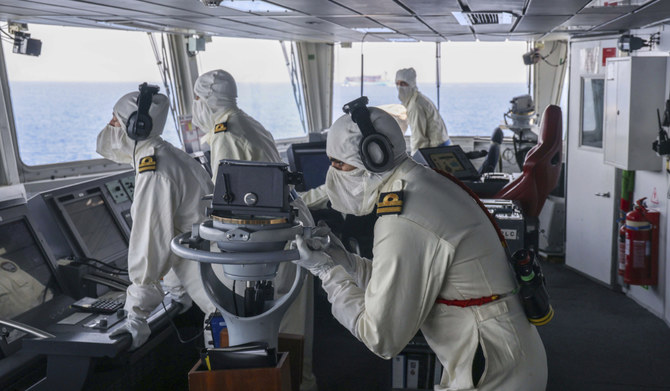
- US military confirmed that the Houthis launched three anti-ship ballistic missiles but caused minor damage to the ship
- A missile landed in the vicinity of a second vessel, the MV Maisha, but it was not damaged, US Centcom said on social media site X
CAIRO/LOS ANGELES: Yemen’s Houthis said on Saturday their missiles hit the Andromeda Star oil tanker in the Red Sea, as they continue attacking commercial ships in the area in a show of support for Palestinians fighting Israel in the Gaza war.
US Central Command confirmed that Iran-backed Houthis launched three anti-ship ballistic missiles into the Red Sea from Yemen causing minor damage to the Andromeda Star.
The ship’s master reported damage to the vessel, British maritime security firm Ambrey said.
A missile landed in the vicinity of a second vessel, the MV Maisha, but it was not damaged, US Central Command said on social media site X.
Houthi spokesman Yahya Sarea said the Panama-flagged Andromeda Star was British owned, but shipping data shows it was recently sold, according to LSEG data and Ambrey.
Its current owner is Seychelles-registered. The tanker is engaged in Russia-linked trade. It was en route from Primorsk, Russia, to Vadinar, India, Ambrey said.
Iran-aligned Houthi militants have launched repeated drone and missile strikes in the Red Sea, Bab Al-Mandab Strait and Gulf of Aden since November, forcing shippers to re-route cargo to longer and more expensive journeys around southern Africa and stoking fears the Israel-Hamas war could spread and destabilize the Middle East.
The attack on the Andromeda Star comes after a brief pause in the Houthis’ campaign that targets ships with ties to Israel, the United States and Britain.
The USS Dwight D. Eisenhower aircraft carrier sailed out of the Red Sea via the Suez Canal on Friday after assisting a US-led coalition to protect commercial shipping.
The Houthis on Friday said they downed an American MQ-9 drone in airspace of Yemen’s Saada province.
Syrian woman is jailed for life over Istanbul killer blast; over 20 others also get prison sentences
Syrian woman is jailed for life over Istanbul killer blast; over 20 others also get prison sentences
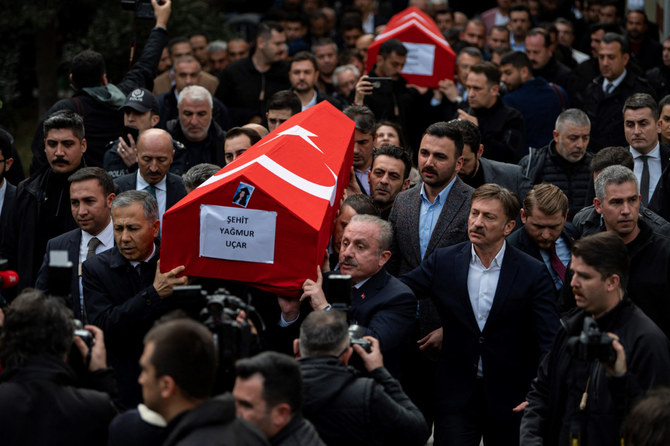
- Ahlam Albashir was given a total of seven life sentences by a Turkish court for carrying out the attack in Istiklal Avenue on Nov. 13, 2022
- Twenty others were given prison sentences ranging from four years to life
JEDDAH: A Syrian woman who planted a bomb that killed six people in Istanbul’s main shopping street 18 months ago was jailed for life on Friday.
Ahlam Albashir was given a total of seven life sentences by a Turkish court for carrying out the attack in Istiklal Avenue on Nov. 13, 2022. Six Turkish citizens, two members each from three families, died in the blast in the busy street packed with shoppers and tourists. About 100 people were injured.
More than 30 other people were accused in connection with the explosion. Four were released from prison on Friday, and a further 10 were ordered to be tried separately in their absence because they could not be found.
Twenty others were given prison sentences ranging from four years to life. Of those, six received aggravated life imprisonment for murder and “disrupting the unity and integrity of the state.”
Turkiye blamed Kurdish militants for the explosion, and said the order for the attack was given in Kobani in northern Syria, where Turkish forces have conducted operations against the Syrian Kurdish YPG militia in recent years.
The YPG and the outlawed PKK Kurdish separatist group, which has fought a decades-old insurgency against the Turkish state, denied involvement in the attack. No group admitted it.
Istanbul has been attacked in the past by Kurdish, Islamist and leftist militants. A wave of bombings and other attacks began nationwide when a ceasefire between Ankara and the PKK broke down in mid-2015.
More than 40,000 people have been killed in the PKK’s conflict with Turkiye since the militant group took up arms in 1984. It is considered a terrorist organisation by Turkiye, the EU and the US.
1 case dismissed, 4 on hold in UN investigation into Oct. 7 allegations against UNRWA staff
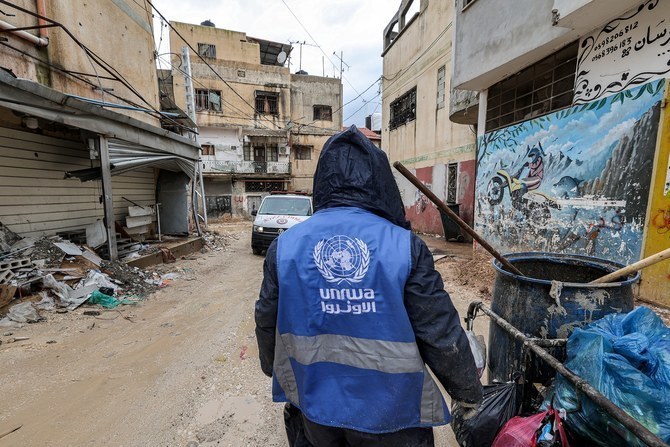
- Investigators have been looking into cases of 12 agency workers accused by Israel in January of participating in attacks by Hamas, and 7 others named later
- 14 cases remain under investigation but the others were dismissed or suspended due to lack of evidence; UN’s internal investigators due to visit Israel again in May
NEW YORK CITY: UN spokesperson Stephane Dujarric said on Friday that the organization’s internal oversight body has been investigating 19 employees of the UN Relief and Works Agency for Palestine Refugees over allegations that they were affiliated with Hamas and other militant groups.
Israeli authorities alleged in January that 12 UNRWA workers participated in the Oct. 7 attacks by Hamas against Israel.
The agency immediately cut ties with the named individuals, and UN Secretary-General Antonio Guterres, in consultation with UNRWA Commissioner General Philippe Lazzarini, ordered an independent review to evaluate the measures taken by the agency to ensure adherence to the principle of neutrality and how it responds to allegations of breaches of neutrality, particularly in the challenging context of the situation in Gaza.
In a wide-ranging report published this week, the investigators, led by Catherine Colonna, a former foreign minister of France, said Israeli authorities have yet to provide any evidence to support the allegations against UNRWA workers. They also noted that Israel had not previously raised concerns about any individuals named on the agency staffing lists it has been receiving since 2011.
They stated in the report: “In the absence of a political solution between Israel and the Palestinians, UNRWA remains pivotal in providing life-saving humanitarian aid and essential social services, particularly in health and education, to Palestinian refugees in Gaza, Jordan, Lebanon, Syria and the West Bank.
“As such, UNRWA is irreplaceable and indispensable to Palestinians’ human and economic development. In addition, many view UNRWA as a humanitarian lifeline.”
Guterres also ordered a separate investigation by the UN’s own Office of Internal Oversight Services to determine the accuracy of the Israeli allegations. The mandate of the OIOS, an independent office within the UN Secretariat, is to assist the secretary-general in the handling of UN resources and staff through the provision of internal audit, investigation, inspection and evaluation services.
Dujarric said the 19 members of UNRWA staff under investigation included the 12 named by the Israeli allegations in January, whose contracts were immediately terminated, and seven others the UN subsequently received information about, five in March and two in April.
Of the 12 employees identified by Israeli authorities in January, eight remain under OIOS investigation, Dujarric said. One case was dismissed for lack of evidence and corrective administrative action is being explored, he added, and three cases were suspended because “the information provided by Israel is not sufficient for OIOS to proceed with an investigation. UNRWA is considering what administrative action to take while they are under investigation.”
Regarding the seven additional cases brought to the attention of the UN, one has been suspended “pending receipt of additional supporting evidence,” Dujarric said.
“The remaining six of those cases are currently under investigation by OIOS. OIOS has informed us that its investigators had traveled to Israel for discussions with the Israeli authorities and will undertake another visit during May.
“These discussions are continuing and have so far been productive and have enabled progress on the investigations.”
The initial allegations against some members of its staff threw the agency, which provides aid and other services to Palestinian refugees in Gaza and across the region, into crisis. The US, the biggest single funder of UNRWA, and several other major donors put their contributions to the organization on hold.
In all, 16 UN member states suspended or paused donations, while others imposed conditions on further contributions, putting the future of the agency in doubt. Many of the countries, including Germany, later said their funding would resume. However, US donations remain on hold.
37 million tonnes of debris in Gaza could take years to clear: UN
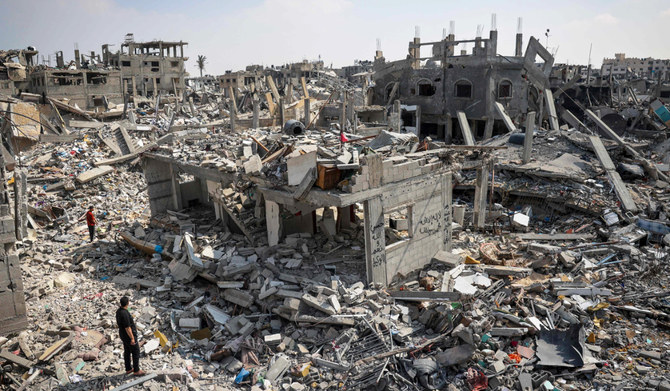
- “We do know that we estimated 37 million tonnes of debris, which is approximately 300 kg per square meter,” Lodhammar added
- Israel has killed more than 34,000 Palestinians in Gaza, mostly women and children, according to the health ministry in the Hamas-run territory
GENEVA: There are some 37 million tonnes of debris to clear away in Gaza once the Israeli offensive is over, a senior official with the UN Mine Action Service said on Friday.
And unexploded ordnance buried in the rubble would complicate that work, said UNMAS’ Pehr Lodhammar, who has run mine programs in countries such as Iraq.
It was impossible to say how much of the ammunition fired in Gaza remained live, said Lodhammar.
“We know that typically there is a failure rate of at least 10 percent of land service ammunition,” he told journalists in Geneva.

“We do know that we estimated 37 million tonnes of debris, which is approximately 300 kg per square meter,” he added.
He said that starting from a hypothetical number of 100 trucks would take 14 years to clear away.
Lodhammar was speaking as UNMAS launched its 2023 annual report on Friday.
The war in Gaza between Israel and Hamas erupted when Hamas launched an unprecedented attack on Israel on Oct. 7.
Also on Friday, the head of an aid group warned that an Israeli assault on southern Gaza’s Rafah area would spell disaster for civilians, not only in Gaza but across the Middle East,
Jan Egeland said the region faced a “countdown to an even bigger conflict.”
Egeland, the secretary-general of the Norwegian Refugee Council, also said that 1.3 million civilians seeking refuge in Rafah — including his aid group’s staff — were living in “indescribable fear” of an Israeli offensive.
Egeland urged Israeli Prime Minister Benjamin Netanyahu not to proceed with the operation.
“Netanyahu, stop this. It is a disaster not only for the Palestinians, it would be a disaster for Israel. You will have a stain on the Israeli conscience and history forever,” he said.
The NRC head spoke to Reuters in Lebanon, where he visited southern villages that he said were caught in a “horrific crossfire” between the Israeli military and Hezbollah.
“I am just scared that we haven’t learned from 2006,” said Egeland, referring to the month-long war between Hezbollah and Israel that was the two foes’ last bloody confrontation, during which he headed the UN’s relief operations.
“We do not need another war in the Middle East. At the moment, I’m feeling like (this is a) countdown to an even bigger conflict,” he said.



